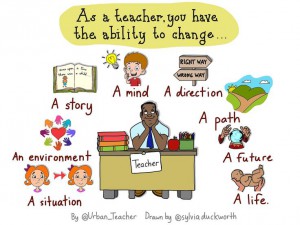
Aristotle once wrote, “Educating the mind without educating the heart is no education at all”. Upon reflecting on my own middle school and high school education, a distant light from the past brings forth memories of both great teachers and inadequate teachers. Among the many schools related memories I carry with me, the memory of my grade eleven English teacher is more vivid than any other. She was quiet, her words were weighted and well thought about, and her passion for literature filled the room in its entirety. Not only did she question her students about iambic pentameters, rhyming meters, or literary analysis, she took the time to understand her students by asking about their worries and fears, their talents and needs, and their passions and interests. In an elegant manner, she danced around the classroom as she spoke about a novel we were to read or a poem she loved. She transmitted her love of literature on to all her students spontaneously. She allowed for freedom and creativity and encouraged wrong answers. She believed that knowledge and wisdom usually spring out of failures and mistakes. True to Aristotle, not only did she take the time to educate the minds of her students, but also, she took the time to fill her hearts with wonder and passion for the written word.
Eventually, we all become the people we admire, or at the very least, we try to. Channelling and pulling on the parts of those who educated me and cared to so well, I hope I can find the strength to mould myself into an educator, a mentor, and a guide for the many minds that shall fill my future classroom. Every one of us is unique in the way we think about and process the world and the way each student views education and learns is no different. It shall be my duty to build a safe and welcoming classroom environment where students are provided with the essentials to prosper and succeed. I aim to be an educator who stands fully and positively next to the student who are risk takers, who support students’ natural curiosity and allows for self-discovery. I understand that technological development has opened up the world and promoted the globalization of ideas, knowledge, and education. Thus, I aspire to be an educator who does not see herself as the primary source of all knowledge, but one who promotes and encourages students’ search for knowledge. Students now have more information on their hands than any generation before them; I see it as my job to direct their curiosity in the right and beneficial direction.
My content areas, English, and the general social sciences, are interconnected. People have always expressed themselves in many artistic forms and literature is one of the dominant forms that make a record of human thoughts, emotions, development, a state of mind, and human history in general. Literature also acts as a window into the past. Combined with Sociology, for example, the study of literature and the understanding of human nature and social conduct provide telltale notes on how people have treated themselves and each other in the past in order to help predict our future. It is my aim to help direct students’ thoughts onto deeper thinking in order to help them find connections between in-class education and life education.
Post University teaching experiences in the TESL/TESOL sectors has prepared me for my future role as a public school teacher. I worked with young adults who are hoping to receive a Canadian university education and adult immigrant women whom many had never attended school before. Both teaching opportunities have paved the teaching path for me, and now I see that very clearly. I loved teaching other what I already knew, and I loved sharing my ideas with an audience that was ready to receive. I loved meeting new students and learning about them, and I loved helping them reach their academic goals. Suddenly their success became mine.